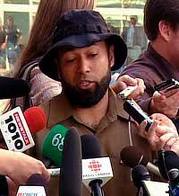 Photo credit: CBC
Photo credit: CBC
In the post 9/11 frenzy there was immense pressure brought by the US government on the Canadian government to ensure that terrorists were not crossing the world's longest border to attack the US. That pressure is clear in the US state cables, and it led to many highly questionable activities by the Canadian government, such as submitting names of their own citizens to the infamous US suspect lists, lists that Maher Arar is still on, even after being cleared of all wrongdoing and apologized to by Canada, as well as awarded 10.5 million dollars and one million in legal costs.
Canada was also under urgent pressure to seek out and prosecute any terrorists at home, which led to the tracking and capture of the Toronto 18 in 2006. Much about this case has been widely criticized over the years. The decision by the federal government to cancel the preliminary inquiry and proceed directly to trial, denying the defense the opportunity to hear the Crown's case, and, more importantly, the chance to cross examine the crown's star witnesses is one controversial element. A preliminary hearing is not a necessary component of a trial, but it is unusual to schedule one and cancel abruptly halfway through. Defense attorneys said they had made concessions to have the right to cross examine these witnesses and they were incensed at the change. And of course, the question rose, never to be put to rest, of what the federal government was afraid of in not allowing the preliminary cross examination.
Along with the preliminary hearing, the publication ban was highly controversial. All evidence was secret, as were trial proceedings, but one of the crown's star witnesses decided to go public. In the words of the Toronto Star in September 2007, Now you can't shut him up. He's been interviewed by the Star, the National Post, the Los Angeles Times, the CBC and most recently the BBC. While the star witness was covering the world with extraordinary allegations about the suspects, there was a ban on anything that may have been said in their defense.
The case against the Toronto 18 was built primarily on both the testimony and actions (which many have called entrapment) of two of the crown's witnesses, Mubin Shaikh, who was paid almost $300,000 by the RCMP for his services, and Shaher Elsohemy, who was given a package worth $4 million. The case is huge, with years of evidence on all aspects, but to get a brief picture of the importance of the crown witnesses, and their credibility, read points 171 - 183 of the reasons for judgement in one case where Justice Sproat applies "The Carter Test" for allowing hearsay evidence of co-conspirators and assesses the credibility of the crown's witness, Mubin Shaikh. The justice's opinion of Shaikh's integrity and credibility was not shared by all. Defense lawyer Dennis Edney suggested that Shaikh — who was 30 years old at the time — was egging on the younger and gullible men. (Four of the suspects were juveniles.)
And what does all of that have to do with us now, in 2011? Well, according to a recently released US state cable* from Wikileaks, Mubin Shaikh was included on a list of names provided to the US as being associated with terrorism. "It was his evidence that took them all down," Edney told CBC. "Most of the warrants for wiretaps that were obtained were obtained as a result of conversations he had with the suspects."
"We aren't commenting on your story," CSIS public relations person Isabelle Scott wrote to CBC. But the story will not go away that easily. At this point, CSIS and the Canadian federal government get to pick their poison. They can state that, once again, their policy of handing over names of the Canadian citizens they are supposed to protect has resulted in a devastating mistake, and attempt to compensate Shaikh while dealing with further loss of credibility. Or, they can state that they were correct in treating Shaikh as a terrorism suspect, leaving them open to liability in the cases of every suspect they prosecuted using Shaikh's testimony.
Defense attorneys Chernovsky and Edney have both said they would probably make formal demands to the Crown, asking why they were not told of whatever information led CSIS to denounce Shaikh to the Americans. Defence counsel are legally entitled to disclosure of all such information, in order to prepare their cases.
In either case, the ongoing policy of handing the names of Canadian citizens over to the US government as "terrorism suspects", without trial or public accountability, has got to stop.
*CBC has elected to redact the names of all people on these lists (except those convicted) to "protect their privacy." It is the opinion of this writer that their privacy was lost the day they were added to a list given to a country famous for abduction and torture of people on this list, and both the people named and the rest of the Canadian public have an overwhelming right to see these names and hear why they were added. If ever there was information that we require in order to make informed decisions in a democracy, this is it.
Theme by Danetsoft and Danang Probo Sayekti inspired by Maksimer